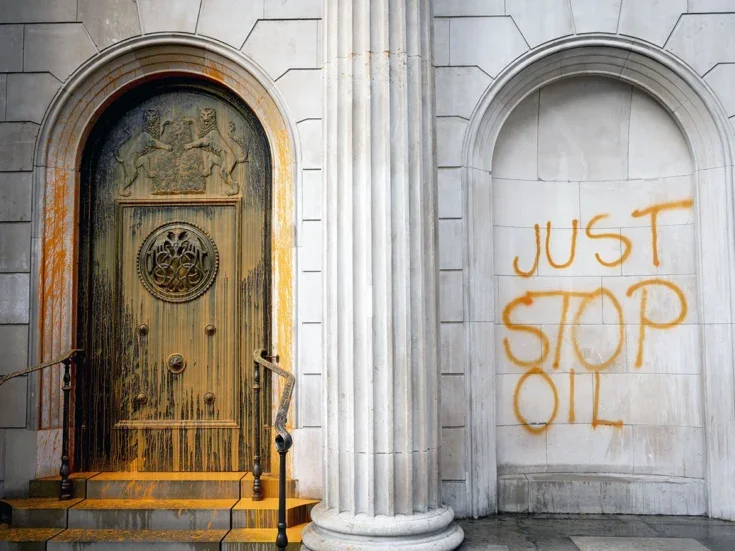The communique of the G20 contained potentially very damaging propositions for the denizens of Mayfair, the City and Wall Street. Josh Spero, Spear’s man on the spot, explains what it all might mean and how likely it is to come to pass
The communique of the G20 contained potentially very damaging propositions for the denizens of Mayfair, the City and Wall Street. Josh Spero, Spear’s man on the spot, explains what it all might mean and how likely it is to come to pass
If my approach to the ExCeL Centre in the Docklands was anything to judge by, the G20 communiqué will be dreary, mystifying and intermittently pointless. Let me explain: the journalists had to disembark from the Docklands Light Railway at a station heretofore only frequented by people coming to dump bodies in London’s most central apocalyptic wasteland. No corpse has ever yet been found there.
A hundred yards away from the station was a large gate guarding a flint-chip floor, shards of grey stone poured across desolate acres. The whole place suggested lunar fields, or earth twenty centuries hence after a nuclear explosion: the sky at 8am was grey, the floor was grey, the journalists were wearing grey clothes and grey, grim expressions.
Before we were allowed to board the coach to take us to the security checkpoint to board another coach to take us to the summit, we had to show our papers to a security guard, then pass through an empty, floorless marquee (perhaps Tardis-like concealing the whole summit).
When you came out the other side, you had your papers checked again in a procedure of quite monumental futility: why pass through an empty marquee? Was something intangible, imperceptible occurring? Was it a full-body scan? This futility and the greyness together suggested well-heeled immigrants fleeing a Balkan warzone.

Thus came out the communiqué after a hard day’s bargaining, written in the grey language politicians like in treaties and such which allows them stupendous room to manoeuvre back home. It, in contrast to the marquee, the result of bad planning, was deliberately vague.
To read more from Spear’s on the G20 Summit, see Josh Spero’s liveblog from the ExCeL Centre, William Cash’s analysis of what the G20 means for tax havens and Vanessa Neumann’s report from the protests.
When Gordon Brown slunk – in his mind, strode – on stage, communiqué in hand and blather in mouth, he came not to praise bankers, nor even to bury them, but to imprison them with iron cages of regulation and electric fences of tax information exchange treaties and the dangling noose of pay restraint.
Hedge funds will be regulated! (Pruned?) Financial instruments will be regulated! (With Brown as the fiscal conductor?) Shadow markets will be regulated! (This of course makes no metaphorical sense.)
Standing in the near-dark between two rows of G20 flags, in alphabetical order rather than rate of recession, spotlights and flashlights on him, el Gordo briskly ran through the communiqué, testing even my swift-wristed shorthand. Perhaps the darkness was kind to him, as it meant no-one could clearly see the jig of joy he must have been doing behind the podium.
In reality, as ever, the global success of these measure is unenforceable by the G20 as a body: it requires national governments to lay down the law back home. That we have an FSA which has been shamed by its most laissez of laissez-faire policies will make it easier.
What exactly was Gordon after? To see his true intentions, you have to turn to the report of the Financial Stability Forum, soon to be renamed and possibly retoothed as the Financial Stability Board (so much more reassuring).
Its report ‘Principles for Sound Compensation Practices’, released on the day of the summit and currently ranking in the Amazon hot one-million list just above Gordon’s latest tome, gives the substance to the bluster.
To read more from Spear’s on the G20 Summit, see Josh Spero’s liveblog from the ExCeL Centre, William Cash’s analysis of what the G20 means for tax havens and Vanessa Neumann’s report from the protests.
If the British government manages to overcome its own very vested interests (the Conservatives are equally if not more beholden to the City, so it’s not a party-political issue), investment bankers and hedge fund managers and others will face an ‘independent and expert’ board of directors, who must ‘monitor and review’ the compensation system to ensure ‘the effective alignment of compensation with prudent risk taking’. The time horizon (over which the capitalist sun has lately been setting) must be ‘sensitive’.
While this sounds at first sight highly attractive – who doesn’t want independence and prudence? Gordon certainly said he loved the latter – it would apply the brakes to any kind of daredevilry, even the kind which makes financial centres rise with innovation and risks that pay off. Making ‘compensation outcomes … symmetric with risk outcomes’ may turn the lions of the London jungle into neutered toms. This is certainly something to be wary of if indeed the government can make it law.
Unmentioned but present, it sounds like the real losers might be executive remuneration firms, who have never knowingly under-rewarded anyone. Responsibility rests firmly with the board now.
Increased regulation of bank capital, loss provisions and leverage could further dampen the spirit of the City. Few would argue that banks should not have better capital cushions, but they would say that now is the hardest time to restuff them: the government wants them to loan and save at the same time. Whereas leverage used to be the way out of this, now even leverage is suspect. Leverage positions will also have to be declared, which seems like showing your cards before you’ve made your bet.
To read more from Spear’s on the G20 Summit, see Josh Spero’s liveblog from the ExCeL Centre, William Cash’s analysis of what the G20 means for tax havens and Vanessa Neumann’s report from the protests.
Perhaps most worrying is the regulation of ‘systemically important financial institutions, instruments and markets’, which will include hedge funds for the first time. If you think of hedge funds as another outlet for clever stockpicking, which they are in their ability not just to pick risers but fallers too, this is another blow for City creativity.
No-one would justify destroying an otherwise-solid company when it’s on its way down by hedging against it, although the temporary ban on short-selling seemed to show that some thought this was appropriate last October and November. Forcing regulation on hedge funds, however, will diminish an otherwise quite reasonable way of working with the stock market.
It may not get that far. The phrase ‘systemically important’ sounds like a ready-made fudge: how many hedge funds are there which could bring down an economy? Collectively, certainly they can be dangerous, but isolating the crucial ones is a fool’s errand.
This can be read as the triumph of the Franco-German alliance over the Anglo-American one: Wall Street, the City and Mayfair will be most closely bound by this, although it is salutary to remember who brought Volkswagen to its knees by shorting its shares. This may all yet prove empty or impossible to enforce.
Back in the aircraft hangar of the ExCeL Centre, where 2000 journalists were distributed 50 to a row, the atmosphere was less feverish and more one of intense concentration, punctuated by the sort of swearing hacks are famous for and calls from the news desk in home countries.
The conditions could not be complained about – indeed, food and drink were plentiful even if emerging outside was verboten – but the impression given to anyone who saw a television interview from one of slightly elevated platforms with a view over the rows of desk would certainly have been that of a battery chicken farm, each one clucking in close proximity to its neighbours, spitting feathers as the cock of the walk (or Sarko on the monitors) preened and posed.
Indeed, had we been chickens or even civilians (as non-journalists are not known among the profession), PETA or Amnesty would have had something to say about a twelve-hour shift at the centre of the world.
The end of the day was exhaustion and darkness, but the sense of grey pervaded: the communiqué was thrilling bombast when it was delivered, but hour by hour it became greyer and more compromised. The failure to issue a tax haven blacklist – China. The lack of new national fiscal stimuli – France and Germany. The absence of certain domestic tax havens on the OECD’s list – the UK and the US.
Nonetheless, if the grey bleaches away and the black text remains, the financial sectors of the financial centres of the world may feel bitten and bound by el Gordo’s mania for regulation.
To read more from Spear’s on the G20 Summit, see Josh Spero’s liveblog from the ExCeL Centre, William Cash’s analysis of what the G20 means for tax havens and Vanessa Neumann’s report from the protests.






